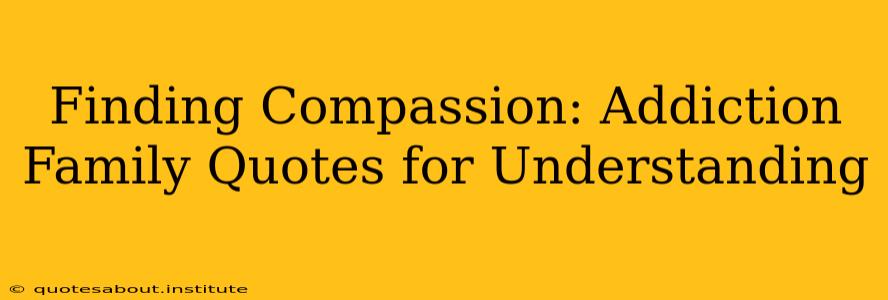Addiction impacts not just the individual struggling, but their entire family system. The emotional toll is immense, leaving loved ones feeling confused, hurt, and lost. Understanding the complex dynamics within an addicted family requires empathy and a willingness to learn. This article explores the profound impact of addiction on families, offering insightful quotes and perspectives to foster compassion and encourage healing.
What are the common struggles faced by families affected by addiction?
Families grappling with addiction face a unique set of challenges. These often include:
- Emotional Rollercoaster: The unpredictable nature of addiction leads to constant ups and downs, leaving family members feeling exhausted and emotionally drained. Hope is often followed by disappointment, creating a cycle of stress and anxiety.
- Financial Strain: The costs associated with addiction – treatment, legal fees, lost wages – can significantly impact a family's financial stability. This added stress can exacerbate existing tensions.
- Guilt and Shame: Family members may struggle with feelings of guilt for not being able to "fix" the situation or shame associated with the stigma of addiction.
- Relationship Breakdown: Addiction can severely strain relationships, leading to conflict, resentment, and even separation or divorce. Communication often breaks down, further isolating family members.
- Fear and Uncertainty: The unpredictable nature of addiction breeds fear and uncertainty about the future. Family members may worry about their loved one's safety, their own well-being, and the stability of the family unit.
How can families find compassion and understanding in the midst of addiction?
Compassion is key to navigating the complexities of addiction within a family. It involves understanding the illness without condoning the behavior. Here are some ways families can foster compassion:
- Education: Learning about addiction as a disease can help alleviate judgment and foster understanding. Understanding the neurobiological underpinnings of addiction can help families shift from blame to compassion.
- Setting Boundaries: Healthy boundaries are crucial. This doesn't mean abandoning the loved one, but rather protecting oneself from further harm. This might involve limiting contact or refusing to enable destructive behaviors.
- Self-Care: Family members must prioritize their own well-being. This involves engaging in activities that promote physical and emotional health, such as exercise, meditation, or therapy.
- Support Groups: Connecting with others who have shared experiences can provide invaluable support and understanding. Al-Anon and Nar-Anon are excellent resources for family members of addicts.
- Professional Help: Seeking professional guidance from a therapist or counselor can help families develop coping mechanisms and navigate the emotional complexities of addiction.
What are some inspiring quotes that speak to the experience of families affected by addiction?
Many powerful quotes capture the essence of navigating addiction as a family:
-
"The most basic of all human needs is the need to understand and be understood." This emphasizes the importance of communication and empathy in family relationships affected by addiction.
-
"Addiction is a family disease." This highlights the impact of addiction on the entire family system, not just the individual struggling.
-
"Recovery is a journey, not a destination." This emphasizes the ongoing nature of recovery for both the addict and the family.
-
"Compassion is not weakness; it's a powerful force for change." This highlights the importance of empathy in supporting recovery.
-
"You can’t control other people’s choices, but you can control your own response." This underscores the importance of setting boundaries and prioritizing self-care.
How can families support a loved one's recovery from addiction?
Supporting a loved one's recovery requires patience, understanding, and a commitment to the process. Here's how families can provide effective support:
-
Encourage Professional Help: Urge your loved one to seek professional help from a therapist, counselor, or addiction specialist.
-
Attend Family Therapy: Family therapy can help address communication issues, improve relationships, and build support systems.
-
Offer Unconditional Love and Support: Let your loved one know you care, even when their actions are frustrating or hurtful.
-
Celebrate Milestones: Acknowledge and celebrate each step forward in their recovery journey.
-
Avoid Enabling Behaviors: Refrain from behaviors that enable the addiction, such as providing money or covering up for their actions.
What resources are available for families affected by addiction?
Numerous resources offer support and guidance for families grappling with addiction. These include:
- Al-Anon/Alateen: Support groups for family and friends of alcoholics.
- Nar-Anon: Support groups for family and friends of addicts.
- SAMHSA National Helpline: A confidential, free, 24-hour-a-day, 365-day-a-year, information service, in English and Spanish, for individuals and family members facing mental and/or substance use disorders.
Finding compassion when dealing with addiction within the family is crucial for healing and recovery. By understanding the challenges, fostering empathy, and utilizing available resources, families can navigate this difficult journey and move toward a healthier future. Remember, recovery is possible, and support makes all the difference.

